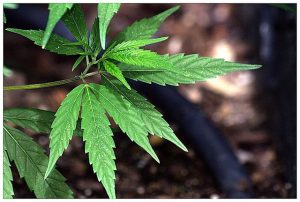Ate an Edible When Cani Breast Feed
Marijuana is on the American Academy of Pediatrics Committee on Drugs (2001) list of Drugs of Abuse for Which Adverse Effects on the Infant During Breastfeeding Have Been Reported. The AAP notes "Only 1 report in literature; no effect mentioned; very long half-life for some components."
Separate from the direct, chemical effects of marijuana on a baby, use of marijuana may affect a mother's ability to be able to properly care for her baby. Maternal judgment may be impaired.
Now infants can get
all their vitamin D
from their mothers' milk;
no drops needed with
our sponsor's
TheraNatal Lactation Complete
by THERALOGIX. Use PRC code "KELLY" for a special discount!

flickr cc manuel m. v.
Any secondhand smoke the baby is exposed to increases the amount of the drug your baby receives. Also, because street drugs are rarely pure, marijuana may be laced with other drugs or substances that can also be harmful to the breastfeeding baby.
The active ingredient in marijuana, THC, will be stored in mom's fat tissues for long periods (weeks to months) and will build up in the body with continued use. Small to moderate secretion into breastmilk has been documented, and THC is concentrated in human milk. According to Hale, analysis of breastmilk from chronic heavy users indicated an eight-fold concentration in milk compared to mom's blood plasma, however the dose received by baby was insufficient to produce significant side effects. Studies have shown significant absorption and metabolism in infants, although long term effects have not been shown.
Marijuana can cause sleepiness in the baby, which can lead to slow weight gain and possibly slow overall development in the baby long term. In addition, babies whose mothers smoke marijuana regularly have a higher risk of SIDS.
Hale reports a possibility of decreased milk production. In animals, THC decreases the amount of milk produced by suppressing the production of prolactin and, possibly, by a direct action on the mammary glands.
There is significant brain growth occurring during a baby's first months of life; marijuana may alter brain cells. Animal studies (on babies whose mothers' milk contained THC) have shown that DNA and RNA metabolism may also be affected and the proteins needed for proper growth and development impaired.
After a breastfeeding mother uses marijuana, THC is evident in her baby's urine and stools (Perez-Reyes and Wall, 1982). Infants exposed to marijuana via breast milk will test positive in urine screens for long periods (2-3 weeks).
One study (Astley and Little, 1990) found that exposure to marijuana through their mother's milk during the first month of life resulted in decreased motor development at one year of age. In another study of 27 infants evaluated at 1 year of age who were exposed to marijuana via breastmilk (compared to 35 nonexposed infants), no significant differences were found in terms of age at weaning, growth, and mental or motor development. Follow-up of these infants has been limited.
Another study (Baker, Datta, et al 2018) sampled milk from eight mothers who regularly consumed cannabis, finding concentrations of delta-9-tetrahydrocannabinol (THC) such that breastfeeding infants would receive 2.5% of the maternal dose. The study cautions: "The long-term neurobehavioral effect of exposure to delta-9-tetrahydrocannabinol on the developing brain is unclear. Mothers should be cautious using cannabis during pregnancy and breastfeeding."
References and additional information
Cannabis. Entry from the Drug and Lactation Database (LactMed).
Marijuana Use During Breastfeeding by Susan Condon, IBCLC, CLE, CLC
Social Drugs and Breastfeeding: Handling an issue that isn't black and white by Denise Fisher, BN, RN, RM, IBCLC. Discusses nicotine, alcohol, caffeine, marijuana, heroin, and methadone.
Marijuana from National Institute on Drug Abuse (NIDA)
References
[most recent references listed first]
Baker T, Datta P, et al. Transfer of Inhaled Cannabis Into Human Breast Milk Obstetrics & Gynecology. April 2018: doi: 10.1097/AOG.0000000000002575
Hale TW, Rowe HE. Medications and Mothers Milk. 17th Edition. New York, New York: Springer Publishing Company; 2017: 146-48.
Behnke M, Smith VC. Prenatal substance abuse: short- and long-term effects on the exposed fetus. Pediatrics. 2013;131(3):e1009-24.
Mohrbacher N. Breastfeeding Answers Made Simple. Amarillo, Texas: Hale Publishing, 2010: 543.
Garry A, Rigourd V, Amirouche A, Fauroux V, Aubry S, Serreau R. Cannabis and breastfeeding. J Toxicol. 2009;2009:596149. Epub 2009 Apr 29.
Djulus J, Moretti M, Koren G. Marijuana use and breastfeeding. Can Fam Physician. 2005 Mar;51:349-50.
Liston J. Breastfeeding and the use of recreational drugs–alcohol, caffeine, nicotine and marijuana. Breastfeed Rev. 1998 Aug;6(2):27-30.
Dreher MC, Nugent K, Hudgins R. Prenatal marijuana exposure and neonatal outcomes in Jamaica: an ethnographic study. Pediatrics. 1994 Feb;93(2):254-60.
Hayes JS, Lampart R, Dreher MC, Morgan L. Five-year follow-up of rural Jamaican children whose mothers used marijuana during pregnancy. West Indian Med J. 1991 Sep;40(3):120-3.
Astley SJ, Little RE. Maternal marijuana use during lactation and infant development at one year. Neurotoxicol Teratol. 1990 Mar-Apr;12(2):161-8.
Tennes K, Avitable N, Blackard C, Boyles C, Hassoun B, Holmes L, and Kreye M. 1985. ![]() Marijuana: prenatal and postnatal exposure in the human. In: Current research on the consequences of maternal drug abuse. NIDA Res Monogr. 1985;59:48-60.
Marijuana: prenatal and postnatal exposure in the human. In: Current research on the consequences of maternal drug abuse. NIDA Res Monogr. 1985;59:48-60.
Perez-Reyes M, Wall ME. Presence of delta9-tetrahydrocannabinol in human milk. N Engl J Med. 1982 Sep 23;307(13):819-20.
Harclerode J. ![]() The effect of marijuana on reproduction and development. In: Petersen RC, ed. Marijuana Research Findings: 1980. NIDA Res Monogr. 1980;31:137-66.
The effect of marijuana on reproduction and development. In: Petersen RC, ed. Marijuana Research Findings: 1980. NIDA Res Monogr. 1980;31:137-66.
Source: https://kellymom.com/bf/can-i-breastfeed/lifestyle/marijuana/
0 Response to "Ate an Edible When Cani Breast Feed"
Postar um comentário